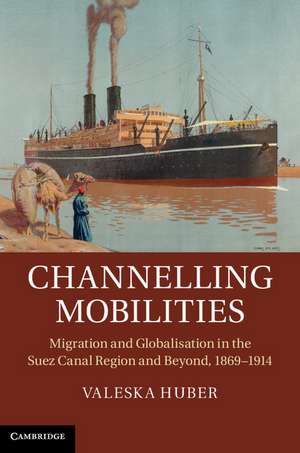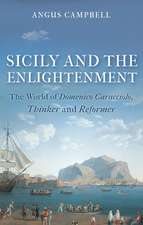Channelling Mobilities: Migration and Globalisation in the Suez Canal Region and Beyond, 1869–1914
Autor Valeska Huberen Limba Engleză Hardback – 31 iul 2013
| Toate formatele și edițiile | Preț | Express |
|---|---|---|
| Paperback (1) | 316.16 lei 6-8 săpt. | |
| Cambridge University Press – 25 noi 2015 | 316.16 lei 6-8 săpt. | |
| Hardback (1) | 523.73 lei 6-8 săpt. | |
| Cambridge University Press – 31 iul 2013 | 523.73 lei 6-8 săpt. |
Preț: 523.73 lei
Preț vechi: 588.46 lei
-11% Nou
Puncte Express: 786
Preț estimativ în valută:
100.26€ • 104.22$ • 83.13£
100.26€ • 104.22$ • 83.13£
Carte tipărită la comandă
Livrare economică 07-21 februarie 25
Preluare comenzi: 021 569.72.76
Specificații
ISBN-13: 9781107030602
ISBN-10: 1107030609
Pagini: 365
Ilustrații: 24 b/w illus. 1 map
Dimensiuni: 157 x 235 x 26 mm
Greutate: 0.68 kg
Ediția:New.
Editura: Cambridge University Press
Colecția Cambridge University Press
Locul publicării:New York, United States
ISBN-10: 1107030609
Pagini: 365
Ilustrații: 24 b/w illus. 1 map
Dimensiuni: 157 x 235 x 26 mm
Greutate: 0.68 kg
Ediția:New.
Editura: Cambridge University Press
Colecția Cambridge University Press
Locul publicării:New York, United States
Cuprins
Introduction: mobility and its limits; Part I. Imperial Relay Station: Global Space, New Thresholds, 1870s–90s: 1. Rites de passage and perceptions of global space; 2. Regimes of passage: troops in the canal zone; 3. Companies and workers; Part II. Frontier of the Civilising Mission: Mobility Regulation East of Suez, 1880s–1900s: 4. Bedouin and caravans; 5. Dhows and slave trading in the Red Sea; 6. Mecca pilgrims under imperial surveillance; Part III. Checkpoint: Tracking Microbes and Tracing Travellers, 1890s–1914: 7. Contagious mobility and the filtering of disease; 8. Rights of passage and the identification of individuals; Conclusion: rites de passage and rights of passage in the Suez Canal region and beyond; Bibliography.
Recenzii
'Valeska Huber's richly detailed study of the Suez canal confounds a view of history as ever-increasing connections across space. She shows that the canal was a choke point as well as a connector, a 'decelerator' as much as an 'accelerator' of movement, and a site where governing elites sought to control migration and to elaborate and enforce distinctions among people, not simply to facilitate their mobility and interaction.' Frederick Cooper, co-author of Empires in World History: Power and the Politics of Difference
'A sophisticated examination of a variety of global connections and systems of control as they impacted the peoples affected by the opening of the Suez Canal. This invaluable contribution to the growing literature on nineteenth-century globalization provides a marvelous model for the study of the interaction of the global and the local everywhere.' E. Roger Owen, author of State, Power and Politics in the Making of the Modern Middle East
'This is a fascinating book. The opening of the Suez Canal in 1869 typically serves as a short-hand for the dynamic processes of transportation, communication, and globalization in the nineteenth century. As Valeska Huber vividly shows, the story was much more complex. Multiple forms of mobility overlapped in the Canal region; some were accelerated, others slowed down. We learn of steamships and long-distance travel, of military strategies and global trade - but also of camel caravans and Bedouins, of passports and pilgrims to Mecca. This superbly researched book demonstrates that the best global histories are grounded locally.' Sebastian Conrad, author of German Colonialism: A Short Introduction
'Channelling Mobilities takes up a host of binaries related to historical and analytical values and puts them under rigorous historical examination. The result, which is a highly readable and thought-provoking book, is therefore majorly recommended for historians working on late nineteenth- and early twentieth-century 'imperial' and/or 'global' history.' Nitin Sinha, The International Journal of Maritime History
'A sophisticated examination of a variety of global connections and systems of control as they impacted the peoples affected by the opening of the Suez Canal. This invaluable contribution to the growing literature on nineteenth-century globalization provides a marvelous model for the study of the interaction of the global and the local everywhere.' E. Roger Owen, author of State, Power and Politics in the Making of the Modern Middle East
'This is a fascinating book. The opening of the Suez Canal in 1869 typically serves as a short-hand for the dynamic processes of transportation, communication, and globalization in the nineteenth century. As Valeska Huber vividly shows, the story was much more complex. Multiple forms of mobility overlapped in the Canal region; some were accelerated, others slowed down. We learn of steamships and long-distance travel, of military strategies and global trade - but also of camel caravans and Bedouins, of passports and pilgrims to Mecca. This superbly researched book demonstrates that the best global histories are grounded locally.' Sebastian Conrad, author of German Colonialism: A Short Introduction
'Channelling Mobilities takes up a host of binaries related to historical and analytical values and puts them under rigorous historical examination. The result, which is a highly readable and thought-provoking book, is therefore majorly recommended for historians working on late nineteenth- and early twentieth-century 'imperial' and/or 'global' history.' Nitin Sinha, The International Journal of Maritime History
Notă biografică
Descriere
This book examines the people using and passing by the Suez Canal to reassess the history of globalisation before 1914.









